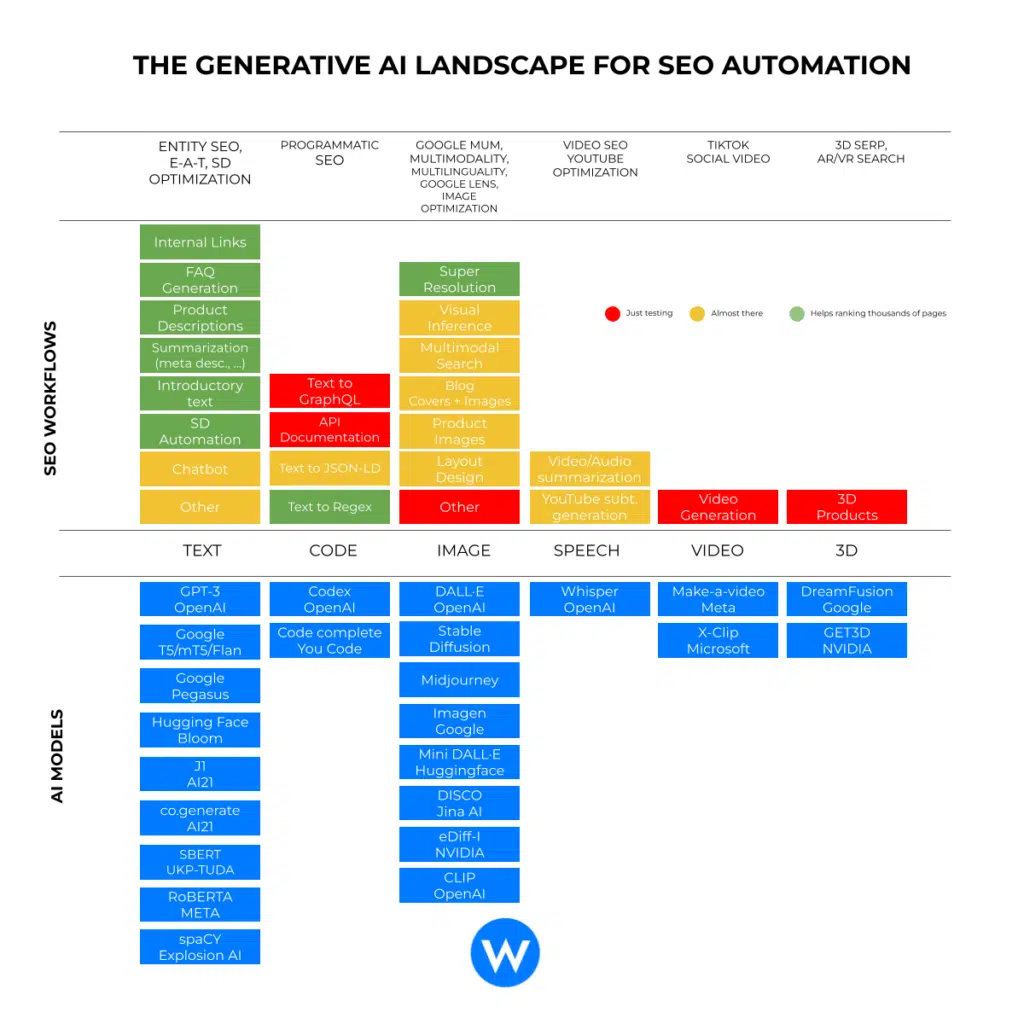When Google announced the helpful content update, many in the SEO industry expected AI-generated content to get hit hard.
I was expecting AI-generated content to get wiped out by this supposedly sweeping update, comparable to 2011’s Panda algorithm update. Yet, no major impact was recorded.
Soon after, Google released the October 2022 spam update and that’s when we saw websites using AI content affected, although not as dramatically.
What happened? Let me take a few steps back.
Another vicious Panda attack?
Back in 2011, content farms were a serious problem. Many companies like Demand Media made a fortune by mass-producing low-quality articles.
They created thin content stuffed with all kinds of keyword variations taken from keyword research tools and generated similar articles for each slightly differing version of a popular search query.
Underpaid and often outsourced workers from overseas wrote about topics they had no idea about, often creating gibberish.
Panda was a significant algorithm update that even legitimate blogs were affected. How do I know? My own popular SEO blog also got penalized. I lost most of my major top 10 rankings for phrases like [url seo], [image seo] or [advanced seo] overnight, and haven’t been able to recover them ever since.
Google was under increasing pressure to deal with content farms, especially as the search engine’s then-contender, the now-defunct Blekko, promoted itself as a content farm-free alternative to Google.
Welcome to the future (of search)
We’re living in 2023 and there are still no proper flying cars and jetpacks. What we do have are breakthroughs in automation, particularly for the manufacturing and services sectors.
On the web, it’s even more obvious. Automation helps us every day with a plethora of repetitive tasks and beyond.
The work we do has changed a lot in recent years. Boring and tedious tasks are being replaced by the creative industries. Many even play for a living by being professional skateboarders or gamers, making money as content creators and influencers.
When it comes to SEO, a lot of tasks can get automated, but the results vary. The overall focus of modern SEO is on human-to-human engagement – think of audience building and outreach.
My content creator bias
As a writer, I’ve become increasingly anxious in recent years due to the rise of AI. My fear stemmed not from an imagined Terminator-like apocalypse (even though that might still happen), but more from AI’s potential impact on my own line of work.
Would AI content soon replace actual writers like myself? We don’t know yet. It hasn’t happened as of now. What we do know, though, is that some bloggers use AI content tools to create content themselves.
Saying that AI might replace writers is like saying that typewriters or computers will replace writers. Can a tool replace the person who uses the tool? Maybe for menial tasks. But is writing a menial task?
In a way, I am already using AI just by writing this article. Google Docs offers suggestions to fix my grammar – although not as many as Grammarly (which was too invasive for me) but more than what Microsoft Word provided in the past.
Get the daily newsletter search marketers rely on.
A look at automation in SEO
In SEO, there are many ways to automate repetitive tasks and streamline workflows using various tools.
Keyword research
No single person can compile and assess the data for proper keyword research. Even if you do not use AI or conventional keyword research tools, you at least use Google to check those keywords “manually,” while Google uses advanced algorithms, AI and all types of automation to access keyword databases.
There is indeed unethical or questionable keyword research automation, which involves crawling large numbers of Google results without authorization and causing heavy load on their servers.
That said, this is only relevant for large-scale technical SEOs, as most mere mortals will resort to common keyword research tools that might already include AI input.
Auditing websites
You can get a fully automated website audit from many SEO tools. Even though they can’t match the expertise of an SEO consultant, some are very helpful and often free.
Tools like Semrush, WooRank or HubSpot offer website auditing to inform your SEO strategy. Do not shy away from using them whenever they are helpful.
The only drawback is that some tools may cause a heavy load on a website as they crawl it in its entirety by requesting and parsing hundreds or thousands of pages, at once or in quick succession. I’m not aware of AI tools used to audit website issues but they would make sense for this use case.
Checking links (both internal and external)
Checking internal links or external links from sites that link to you and sites you link to is a classic way of using SEO tools long before AI was sophisticated enough to help with SEO tasks. Internal links can break or simply divert website authority to orphan pages or less important resources.
A well-optimized website has a structure that allows the overall authority to flow freely. AI tools could easily find and track links in ways that go beyond “push button” or “cron job” types of checks. As always, it’s important not to cause too much load on other websites.
Checking rankings
Checking rankings is similar to checking links, but with a twist. Google search results must be crawled using automated tools, which is against their terms of use. If you use ranking checkers from your local computer, your IP might get blocked by Google.
Thus, this is quite risky and should only be an option when you have nothing to lose or you’re advanced technology that either balances the usage of Google resources or obfuscates your tracks to cover up where the load comes from.
I know that some SEO tool providers have access to large server farms to fool Google into believing that legit human users are accessing their services. AI could help to alleviate the issue by causing less load or by hiding the activity better.
What about automated content?
Automating content creation is not an ideal use case. AI tools do not have the firsthand experience Google requires and is expected by readers. They merely rewrite existing knowledge using their “own” words.
In the past, lots of spammers have tried to trick Google into believing that they have content-rich sites by spinning articles and rewriting them with synonyms. Google has long since filtered this from the SERPs.
The new generation of content automation tools run by AI
Many AI content tools proliferate in the market. They have well-designed websites, and some even quote SEO experts who recommend them.
I just searched the web for AI content and found lots of services offering it. Some of these tools are.
Proof Content
Proof Content promotes itself with the slogan, “Data-driven content for brands with something to say,” and claims their AI content is “automated,” “tailored,” and “speedy.”
They use “human editors” so content is not 100% automated. One of their results examples highlights success by an “increase of 127% SEO traffic growth YOY.”
Frase
Frase emphasizes speed even more while still promising improved quality, “Better content, faster.”
They also clearly talk to SEO-driven marketers by declaring they can “create SEO content fast with AI,” adding that “going from keyword to SEO-optimized article has never been easier.”
GrowthBar
The GrowthBar AI content generator is even called growthbarseo.com in the domain name so there is no doubt that it is made to create SEO content. It also says so in its value proposition: “Make SEO … content that Google loves with AI”. It also incorporates a keyword research tool and a Chrome extension.
There is no ambiguity when it comes to the most important use case of these tools – content creation for SEO purposes.
What do the quoted experts say?
Brandan Hufford is quoted on the Frase page as saying:
- “I’ve spent a great deal of time comparing tools to get the most out of what I write, and Frase feels like you’re using content marketing cheat codes.”
Kevin Indig is cited on the same page:
- “Frase feels like a next-gen content tool that’s not just exciting for SEOs, but for writers as well. In my mind, that’s more important to create successful content.”
Thomas Melching encourages the use of GrowthBar with the following:
- “Make SEO-perfect content in one click, generate meta descriptions with AI, and keyword research. GrowthBar is game-changing and it has a free trial.”
Mark Sandusky praises GrowthBar, saying:
- “GrowthBar has helped us break into new SEO categories and write content faster. I use the Content Generator almost daily.”
Can they all be wrong? As they also do not hide their usage of AI content tools they are apparently not afraid of their projects being penalized as spam or thin content.
So, is AI content helpful or spam?
Can we clearly say whether AI content is helpful or spam? Well, we can’t. It depends.
In my opinion, AI content can be both helpful and spam.
The motivation and the effort invested in it are some factors to consider. If you invest zero effort and let the AI do 100% of the work, the risk of getting low-level content farm drivel is high.
It really depends on quality over quantity.
One thing is for sure, churning mass-produced, low-quality content makes all your content less than stellar. It doesn’t matter whether you use AI or inexperienced writers to inflate your website disproportionately, the outcome is the same.
Less is more when it comes to content production. Regular publishing is fine as long as it’s not flooding.
WordLift has an in-depth overview of how “generative AI” can work for SEO content purposes and beyond.
As of now, it mostly works well for easy content-related tasks (green) like:
- FAQ generation.
- Product descriptions.
- Summarization.
- Introductory text.
Human intervention
The key to making AI work in content creation is to double down on quality.
Implement quality control and ensure editorial content involves actual human editors. Do not let AI write and decide by itself. People must stay in charge.
This is also the feedback I got from SEOs using AI for content creation. Their content is never completely automated and there are quality checks to ensure compliance with Google’s standards.
Google Search Advocate John Mueller has been pretty clear about AI content being “still” against Google’s webmaster guidelines in April 2022.
Using AI ethically in SEO
The question of whether AI content is helpful or becomes spam essentially boils down to the ethics behind it. What is the purpose of the automation process?
Do you want to flood Google with potentially useless content just to make money from ad or affiliate revenue? Well, guess what, you are likely to spam.
Do you want to get your hands free from the menial work of rephrasing the basics that AI can gobble up from the web automatically to make sure your contribution is akin to poetry and one of a kind that nonsentient AI can’t replicate? Bingo!
Can creativity get fully automated?
Only truly intelligent AI could actually create as a human being does. Otherwise, it’s merely combining “facts” from elsewhere.
Many science fiction works have dealt with the possibility of artificial intelligence becoming fully alive. Most of those are scary dystopian visions. Some aren’t.
There is a movie that is somewhere in the middle of those two extremes called “I, Robot” starring Will Smith. Based on a novel by Isaac Asimov, a respected science fiction writer, the film captures both the essence of humanity and true artificial intelligence pretty well. Asimov comes close to answering this question. (You can read the novel on Archive.org for free.)
Opinions expressed in this article are those of the guest author and not necessarily Search Engine Land. Staff authors are listed here.
Related stories
New on Search Engine Land

